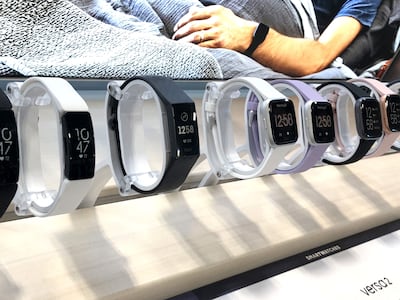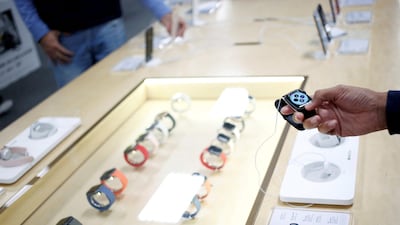Global smartwatch shipments jumped 24 per cent annually to 127.5 million units in 2021 as the industry emerged from coronavirus pandemic-induced disruptions that battered the market in 2020, a report by Counterpoint Research said.
More than 42.2 million units were shipped during the October-December period alone — the highest quarterly shipments ever recorded, the report said.
“The global smartwatch market’s good growth in 2021 is meaningful in itself, but it is more meaningful in that it makes us look forward to future growth,” Counterpoint’s associate director Sujeong Lim said.
“With their ability to monitor important health parameters like blood pressure, ECG and SPO2 [oxygen saturation], these devices are becoming popular. Further, the attractiveness of smartwatches as independent wearable devices will increase if more of them start supporting cellular connectivity.”
One of the driving factors behind the industry's growth was the expansion of the Indian market, the Hong Kong-based market researcher said.
The Indian smartwatch market, which accounted for only 3 per cent of the global market in 2020, surged four times in 2021 to raise its global market share to almost 10 per cent.

Cupertino-based technology manufacturer Apple maintained its number one position with a 30.1 per cent market share in 2021. It sold close to 38.25 million smartwatches last year.
Its average selling price rose 3 per cent and the company accounted for nearly half of total market revenue last year.
Apple was followed by South Korean brand Samsung (10.2 per cent) and Chinese company Huawei (7.7 per cent), which last year sold more than 13 million and 9.8 million units, respectively.
Samsung’s quarterly growth was more than 200 per cent in the third quarter, with the brand’s highest volume of shipments ever.
“Samsung’s growth retained strength until the last quarter. Moving to Wear OS through a partnership with Google has worked well for the brand in many ways,” Counterpoint said.
To challenge the dominance of Apple Watch, which has been the best-selling smartwatch for many years, Samsung teamed up with Google in May. It merged its Tizen OS with Alphabet-owned company’s Wear OS into a single, unified platform.
Google is also reportedly working on its first in-house smartwatch, which it plans to release this year. Fitbit, which showed an annual decrease of more than 15 per cent in 2021, was acquired by the technology behemoth for $2.1 billion in January last year.
Indian smartwatch company Noise was the fastest-growing brand among the global top nine brands and topped the country's charts in 2021 and 2020.
Counterpoint’s associate director
Noise captured the top position [in India] due to its diverse product portfolio targeting the budget and mid segments, as well as strong partnerships with e-commerce players, financial institutions and celebrities,” Counterpoint senior research analyst Anshika Jain said.
“Noise also focused on community-building and slightly shifted its price base towards the lower side to make its smartwatches accessible to a larger group of people, a strategy that proved to be effective.”
The smartwatch market still has room to grow and shipments remain centred on advanced markets such as North America and Europe, Counterpoint said.
Nearly 30 per cent of smartwatches were sold in North America last year, followed by 24 per cent and 19 per cent in China and Europe, respectively.


